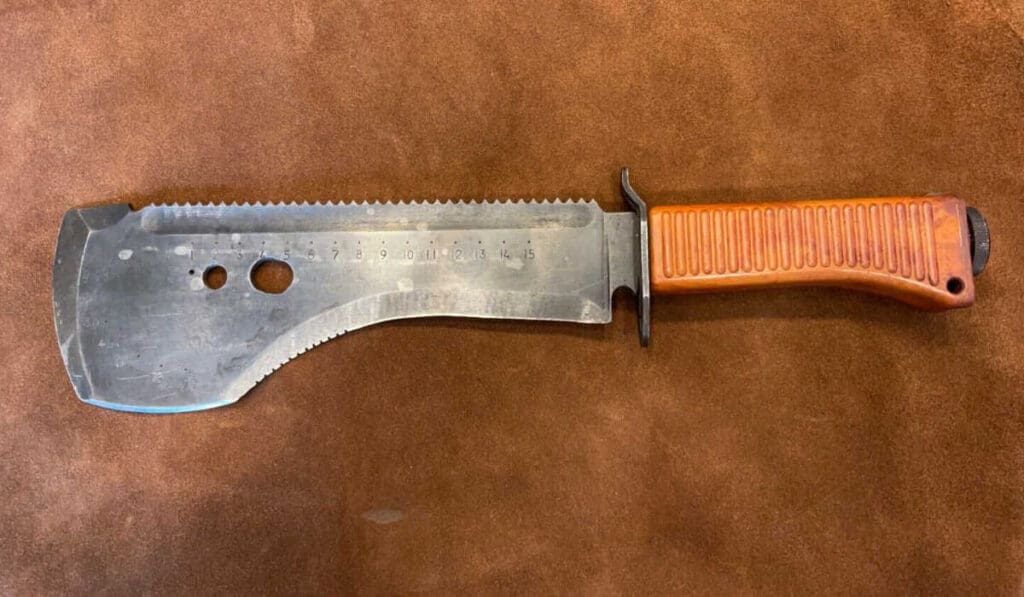Last updated on July 22nd, 2023 at 12:35 am
As an Amazon Associate I earn from qualifying purchases.
At A Glance
In the United States, laws about carrying swords in public vary significantly by state and even local jurisdictions. Most states permit sword carry in public, often requiring a “good reason” such as self-defense, participation in cosplay events, or business-related purposes. Federal law generally restricts carrying bladed weapons in public but allows for transporting a sword in checked luggage under specific guidelines. Open carry (visible carry) and concealed carry (hidden carry) laws differ as well, and these may also dictate the legality of carrying a sword. While sword ownership is usually legal, public carry regulations depend on individual state and local laws. Some exceptions to these laws exist for religious, cultural, or sporting reasons.
Carrying a sword in public may not be the most common sight, but it sometimes raises questions about the legality of such actions. Laws around carrying bladed weapons vary from state to state, and sometimes even within local jurisdictions. Understanding these regulations can help you determine whether it’s permissible to carry a sword in public, and under what circumstances.
In most states, you can legally carry a sword in public, with specific requirements dictating what constitutes a “good reason” for doing so. This may include being over 18 years old, business-related purposes, self-defense, cosplay events, or participation in competitions. However, some states may restrict the length of blades that can be carried openly, so it’s crucial to familiarize yourself with local laws before venturing out with a sword in hand.
While federal law in the United States has similar restrictions on carrying bladed weapons in public, it does allow for packing a sword in checked luggage if done according to specific guidelines. It’s important to note that carrying a sword may be considered a part of religious or cultural practices, as well as a component of sports or martial arts, which could provide some exceptions in certain situations. However, always review your local laws and regulations before deciding to carry a sword in public.
Sword Carrying Laws in the U.S
In the United States, sword-carrying laws vary from state to state, and occasionally even at the local level. There is no overarching federal law regulating the carry of swords, so the legality is primarily determined by individual state laws.
Most states allow the open carry of swords, although some may require a “good reason” for doing so, with the definition of a “good reason” varying by state. Examples of these reasons include being over 18 years old, for business purposes, self-defense, cosplay, or competition. In California, for instance, it is legal to openly carry a sheathed sword, and the law requires it. Concealing such weapons is considered a misdemeanor. In other states, bladed weapons longer than five inches may be illegal for carry.
While knife laws are governed by federal regulation, such as the Switchblade Knife Act of 1958 and its 2009 amendment, these laws mainly apply to individuals traveling between states or internationally. Swords are typically not included under these knife laws due to their larger size and non-folding nature.
Since there is significant variation between state laws, it is essential to research your specific state’s regulations before choosing to carry a sword in public. To avoid legal complications, it may be best to err on the side of caution and avoid carrying a sword in public unless there is a clear and compelling reason to do so.
➤ Read More: State Knife Law Directory
Open Carry vs Concealed Carry
When discussing the legality of carrying a sword in public, it is important to understand the differences between open carry and concealed carry. Open carry refers to carrying a weapon, such as a sword, in public in a manner that is fully or partially visible to others. For instance, in California, it is legal to openly carry a sheathed sword, as long as it is not concealed. On the other hand, concealed carry means carrying a weapon in a hidden fashion, such as under clothing or within a bag.
In many states, you can legally carry a sword in public, but the requirements for open and concealed carry may vary. Some states require that you have a “good reason” for carrying a sword, though what constitutes a “good reason” is not always clearly defined. This could include being over 18 years old, carrying the sword for business purposes, self-defense, cosplay, or competition.
Regarding firearms, some states have stricter regulations. For example, California, Florida, and Illinois, as well as Washington, D.C., generally prohibit people from openly carrying firearms in public, according to USA Facts. New York and South Carolina prohibit openly carrying handguns but not long guns, whereas Massachusetts, Minnesota, and New Jersey prohibit carrying long guns openly but not handguns.
It is crucial to be aware of and follow the specific rules and regulations surrounding open and concealed carry of swords or any weapon in your state. This helps to ensure you are abiding by the law and not putting yourself or others at risk.
Sword Ownership Regulations
In the United States, sword ownership is generally legal, with individuals who are 18 years or older allowed to own swords, including katanas, and other bladed weapons. However, carrying a sword in public differs according to the specific laws and regulations of each state and local area.
Federal laws prohibit the carrying of bladed weapons, such as swords and knives, in public, but they may allow packing a sword in checked luggage if done according to the proper rules (source). In many states, it is legal to carry a sword in public, provided that there is a “good reason.” The definition of a “good reason” can vary from state to state, with acceptable reasons including self-defense, cosplay, or participating in competitions.
In 48 states and territories, there are open carry laws that allow individuals to carry firearms in public, in plain sight. While these open carry laws apply to firearms, they do not necessarily legalize the open carry of all types of bladed weapons, and the specific regulations for swords and other bladed weapons can differ.
It is crucial for sword owners to research and understand their local and state laws and regulations regarding carrying bladed weapons in public, as these can vary significantly from one location to another. This can help prevent any legal issues or misunderstandings when carrying swords in public places or during certain activities.
Special Circumstances
There are some special circumstances where carrying a sword or other bladed weapons in public may be allowed. These instances usually involve cultural, religious, or sporting reasons.
For people engaging in martial arts or sports that involve swords, like kendo or fencing, carrying a sword in public may be allowed, as they are being used as part of a sport. In these cases, make sure to follow safety guidelines and display a clear connection to the practice.
In certain faiths, bladed weapons hold a significant place. For example, Sikhs carry a ceremonial dagger called a kirpan, which is considered a religious symbol and is often allowed in public. However, restrictions may still apply depending on local laws, so it’s crucial to be aware of any legal limitations.
Some people also carry religious knives in adherence to their beliefs. Be mindful to carry such knives in a safe, appropriate manner while respecting local laws.
Outside of swords, it is worth noting that other unconventional weapons sometimes legally permitted in public spaces include flamethrowers, tomahawks, and even lightsabers. Much like sword laws, these allowances vary greatly by state, so always check the specific guidelines for your location.
It’s important to remember that the legality of carrying a sword or any other weapon in public is highly dependent on local laws and regulations. Always stay informed, follow the rules, and exercise caution whenever carrying a weapon for cultural, religious, or sporting reasons.
Traveling with Swords
When traveling with a sword, it’s essential to be aware of the legal restrictions and transportation regulations in each state. The rules for carrying a sword in public vary depending on the state and context. In most states, carrying a sword in public is considered illegal, while in others, carrying one is allowed if you have a valid reason such as self-defense, cosplay, or competition source.
If you plan to travel by air, the Transportation Security Administration (TSA) permits passengers to stow swords in their checked baggage, but not in carry-on bags. To ensure the safety of baggage handlers and inspectors, make sure to sheathe or securely wrap sharp objects when checking your luggage source.
To minimize legal issues when traveling across state lines, it’s best to transport your sword in a locked container or case. Additionally, research the laws governing sword possession and carriage for each state you will be visiting or traveling through source.
Remember, in some states, a “good reason” for carrying a sword may be a determining factor in whether it’s legal. Therefore, if carrying a sword is essential for your intended activity, be prepared to articulate your reasons to law enforcement if necessary.
Taking the time to understand and follow sword carriage regulations will help ensure your travels are safe and hassle-free.
Restricted Areas
Carrying a sword in public is subject to various laws and regulations that typically depend on the jurisdiction. Despite this, there are some common restricted areas where carrying a bladed weapon, such as a sword, is generally prohibited.
In many places, carrying a sword or any fixed blade in public is allowed, as long as it is in a sheathed state and visible. For example, in California, it is legal to openly carry a sheathed sword, while concealing such weapons is considered a misdemeanor. However, the length of the blade might also affect its legality, and in some states, carrying a blade longer than five inches is unlawful.
Firearms and other weapons, like bowie knives, are also subject to restrictions when it comes to specific areas. For example, carrying weapons is often prohibited in places such as:
- Courts
- Schools
- Government buildings
- Restricted areas of jails or law enforcement facilities
In Florida, a detailed list of locations where carrying weapons is restricted can be found in Section 790.06 (12) of the Florida Statutes. The restrictions may vary between different states, so it is crucial to be familiar with the specific laws governing the locale in question.
Keeping these restrictions in mind will help ensure that carrying a sword remains within the confines of the law, preventing any unintended consequences like committing a crime or facing legal charges.
Concealed Blades and Self-defense
Concealed blades, such as cane swords and hidden knives, are often sought after for self-defense purposes. These weapons are designed to be discreet, allowing individuals to carry them without drawing attention. However, it’s important to understand the legal implications and restrictions associated with concealed blades.
In the United States, the federal law regarding knives is primarily the Switchblade Knife Act of 1958 and its 2009 amendment. This law applies to individuals traveling between states or internationally. State laws regarding concealed blades may vary significantly, so it’s crucial to familiarize yourself with your local regulations. Concealed blades like cane swords are often considered illegal, as they may pose a threat to public safety.
When it comes to self-defense, it’s worth noting that carrying a legal self-defense weapon can be a more practical alternative to a concealed blade. Many of these options, such as pepper spray or an expandable baton, are designed for effective personal protection and legal compliance.
In some cases, religious practices may grant exemptions for carrying certain blades. For example, the kirpan is a small sword used in Sikh religious practices and is allowed in the U.S. military and exempted from some state laws regarding blade-carrying restrictions.
Ultimately, when considering carrying a concealed blade for self-defense, it’s vital to research and adhere to the laws within your jurisdiction. Additionally, exploring alternative self-defense tools that are legal and effective can provide a practical solution for personal protection.
Do Sheepsfoot Blades Have A Purpose? (Cuz They’re Ugly…)
Spetsnaz Machetes – Blades Of The Russian Special Forces
What Is The Actual Purpose Of A Spear Point Knife Blade?
CRKT CEO Review – Coolest, Most Worthless Knife Ever?
How Sharp Is A Scalpel? (Is It Sharper Than A Razor?)
Can You Shave With A Knife? (Yes, Here’s How)
As an Amazon Associate I earn from qualifying purchases.







